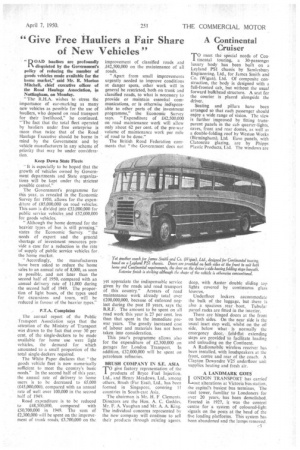"Give Free Hauliers a Fair Share of New Vehicles"
Page 39

If you've noticed an error in this article please click here to report it so we can fix it.
" 111011 OAD hauliers are profoundly 11 disquieted by the Government's policy of reducing the number of goods vehicles made available for the home market," said Mr. IL Morton Mitchell, chief executive officer of the Road Haulage Association, in Nottingham, on Monday.
"The R.H.A. wishes to stress the importance of ear-marking as many new vehicles as possible for the use of hauliers, who depend on road transport for their livelihood," he continued.
The fact that the total fleet operated by hauliers under free enterprise is more than twice that of the Road Haulage Executive should be borne in mind by the Government and by vehicle manufacturers in any scheme of prionty that may be under consideration.
Keep Down State Fleets It is especially to be hoped that the growth of vehicles owned by Government departments and State organizations will be kept under the strictest possible control."
The Government's programme for this year, as revealed itt the Economic Survey for 1950, allows for the expen&tore of £85,000,000 on road vehicles. This sum is divided into £33,000,000 for public service vehicles and £52,000,000 for goods vehicles.
"Although the home demand for the heavier types of bus is still pressing,states the Economic •Survey. "the needs of export and the general shortage of investment resources provide a case for a reduction in the rate' of supply of public service vehicles for the home market.
"Accordingly, the manufacturers have been asked to reduce the home sales to an annual rate of 8,000, as soon as possible, and not later than the second half of 1950, compared with an annual delivery rate of 11,000 during the second half of 1949. The proportion of light buses, of the types used for excursions and tours, will be reduced in favour of the heavier types."
Complains The annual report of the Public 'transport Association says that the attention of the Ministry of Transport was drawn to the fact that over 30 per cent, of the single-deckers to be made available for home use were light vehicles, the demand for which amounted to a small proportion of the total single-deckers required.
The White Paper declares that "the goods vehicle fleet is now numerically sufficient to meet the country's basic needs." In the second half of this year, the annual rate of delivery to home users is to be decreased to 65,000 (£45,000,000), compared with an annual rate of well over 100,000 in the second half of 1949.
Road expenditure is to be reduced to £48,500,000, compared with £50,700,000 in 1949. The sum of £2,300,000 will be spent on the improvement of trunk roads, £3,700,000 on the improvement of classified roads and £42,500,000 on the maintenance of all roads.
"Apart from small improvements urgently needed to improve conditions at danger spots, other work will in general be restricted, both on trunk and classifted roads, to what is necessary to provide or maintain essential communications, or is otherwise indispensable to other parts of the investment programme," the Economic Survey says. "Expenditure of £42,500,000 on road maintenance work will allow only about 62 per cent, of the pre-war volume of maintenance work per mile of road to be done?'
The British Road Federation comments that "the Government does not
yet appreciate the (indispensable service given by the roads and road transport of this country." Arrears of road maintenance work already total over £200,000,000, because of enforced neglect during the past 10 years, says the B.R.F. The amount to be spent on all road work this year is 27 per cent, less than that spent in the immediate prewar years. The greatly increased cost of labour and materials has not been
• taken into consideration.
This year's programme allows also for the expenditure of £2,300,000 on garages for London Transport. In addition, £32,000,000 will be spent on petroleum refineries.
BRUSH COMPANY IN S.E. ASIA
T°give factory representation of the products of Bryce Fuel Injection, Ltd., and Henry Meadows, Ltd., among others, Brush (Far East), Ltd., has been formed in Singapore, covering II countries in South-east Asia.
The chairman is Mr. H. F Clements. Directors are the Hon. A. C. Geddes, Mr. F. A. Vaughan and Mr. A. A. King. The individual concerns represented by the hew company will continue to sell their products through existing agents.
































































































